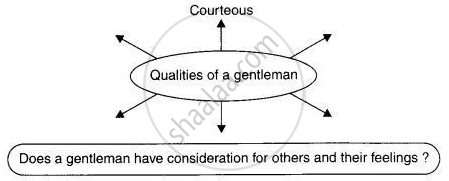Advertisements
Advertisements
प्रश्न
Now read the story given below. Your teacher may use a variety of techniques for
different parts of the story e.g.
• Silent reading
• One student reading aloud to the whole class
• Students reading in small groups
• Dramatised reading in small groups
उत्तर
..
APPEARS IN
संबंधित प्रश्न
What are the qualities of a "gentleman"? Work with your partner and complete
the following web-chart by listing the qualities of a gentleman.

Based on your reading of the story answer the following question by ticking the
correct option.
The narrator did not go inside Lucia's room as
What do you understand by the following statement?
He smiled uncomfortably. "Just plans, sir," he answered in a low voice.
What do you understand by the following statement?
Yet in both these boyish faces there was a seriousness which was far beyond their
years.
Discuss the following question and write the answers in your notebook.
Appearances are deceptive. Discuss with reference to the two boys.
Discuss the following question and write the answers in your notebook.
How does the story 'Two Gentlemen of Verona' promise hope for society?
Two Gentlemen of Verona is written in the first person. A story written in the first person is a first-hand account of events told or narrated through the eyes of a single character, typically the main character. Stories written in the first person are easily identified by the use of the pronoun 'I' rather than 'he or she'.
The reader will see phrases such as "I said, I thought," rather than "he said, she thought." Everything is experienced through the eyes of a single character, and all thoughts and observations are limited to that one person. There can be no outside observer. If the narrator does not see or experience an event first-hand, it cannot be a part of the story. All scenes in the story are filtered through this person's unique perception.
The third-person is a narrative mode in which both the reader and author observe the situation either through the senses and thoughts of more than one character, or through an overarching godlike perspective that sees and knows everything that happens and everything the characters are thinking. In this mode of narration, the narrator can tell the reader things that the main character does not know, or things that none of the characters know.
Rewrite, in third person, any part of story you like
The narrator realises why Nicola and Jacopo work so hard. Yet he does not go in to meet their sister nor does he speak to them about what he learns from the nurse. Working in groups, discuss the following aspects of the story and share your views with the class.
a) The love, devotion and the family values Nicola and Jacopo display.
b) Their pride in themselves and their family
c) The trust they place in the narrator
d) The reason the narrator does not disclose to them that he knows their secret.
Answer the following question:
What will Shakespeare's friend realize when he rises on the Day of Judgment?
Read the given excerpt and answer the questions briefly.
| “Well," I said, "we're leaving on Monday. Is there anything I can do for you before we go?" Nicola shook his head, but suddenly Jacopo said, “Sir," he burst out, "every Sunday we make a visit to the country, to Poleta, 30 kilometres from here. Usually we hire bicycles. But tomorrow, since you are so kind, you might send us in your car." I had already told Luigi he might have the Sunday off. However, I answered, “I'll drive you out myself." There was a pause. Nicola was glaring at his young brother in vexation. "We could not think of troubling you, sir." "It won't be any trouble." |
- Identify the phrase that indicates that the visit to Poleta on Sundays is significant as a routine or tradition. (1)
- What does the narrator's offer to drive the brothers to Poleta reveal about his character? (1)
- Why was there a pause after the narrator’s offer? (1)
- State one reason why Jacopo might have wanted a car ride despite the choice of hired bicycles? (1)
